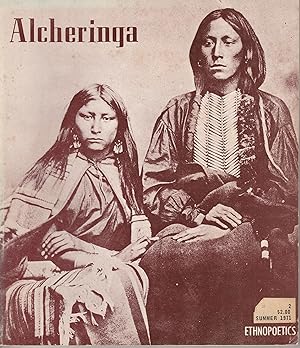Descripción
ALCHERINGA (Ethnopoetics) No. 2, Summer 1971, edited and published by Jerome Rothenberg & Dennis Tedlock, softcover, blue 33 1/3 rpm flexi-disc still attached (containing the 10th and 13th Horse-Songs of Frank Mitchell). ITEM CONDITION: fair. The text block is in fine condition with no tears, dog ears, or marks. The endpapers are foxed as is the top edge. Pages 5-16 are intact, but loose since they have pulled away from the glued binding. There is no bookplate nor signature of a prior owner. This is not a library book nor a remainder. The wraps are in fair condition (some discoloring and foxing). 9 ½ x 8 ¼, 96 pages, 10 ounces XX Contents: From Two Ugaritic Texts, The Oriki Of Alajire, Out Of The Canyon Near Two Turkey Ruin, Pelt Kid And His Grandmother, Wolf Songs And Others Of The Tlingit, Planting Song, 3 Songs Of Mad Coyote, In The Beginning: A Tale From The Mazatec, Masset Mourning Songs, Praises Of Ogun, Primitive: The Critical Term, A Map Of The Dreamtime, Robinal-Achi: Part 4, The 10th And 13th Horse Songs Of Frank Mitchell. [From the Poetry Foundation] Jerome Rothenberg's publishing career began in the late 1950s as a translator of German poetry, first for Hudson Review and then for City Lights Books. Founding Hawk's Well Press in 1959, Rothenberg used it as a venue to publish collections by some of the up-and-coming poets of the era. He also self-published his first book of poems, White Sun Black Sun, under the Hawk's Well imprint. From the beginning, his work embodied experimentation with syntax, image, and form that drew on varied influences and moved in diverse directions. In a career that has already spanned half a century, including seventy books of his own poetry, plus plays, acclaimed anthologies, and other works, Rothenberg has gone on to explore primitive and archaic poetry, sound poetry, found poetry, visual poetry, collaborations, further translations, his own Jewish heritage, and much more. Rothenberg identified with both the 20th-century avant-garde and with "a range of tribal and subterranean poetries" that can provide "a poetics big enough to account for human creativity, human language-making, over the broadest span available." Rothenberg has been particularly interested in the poetry of the North American Indians, both verbal and non-verbal: a poetry that can often be expressed, according to Rothenberg, in "music, non-verbal phonetic sounds, dance, gesture and event, game, dream, etc." It is, he explained, "a high poetry and art, which only a colonialist ideology could have blinded us into labeling 'primitive' or 'savage.'". N° de ref. del artículo 002522
Contactar al vendedor
Denunciar este artículo
![]()

